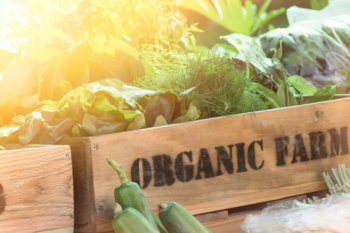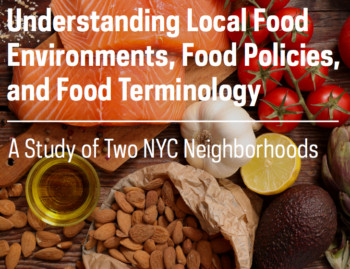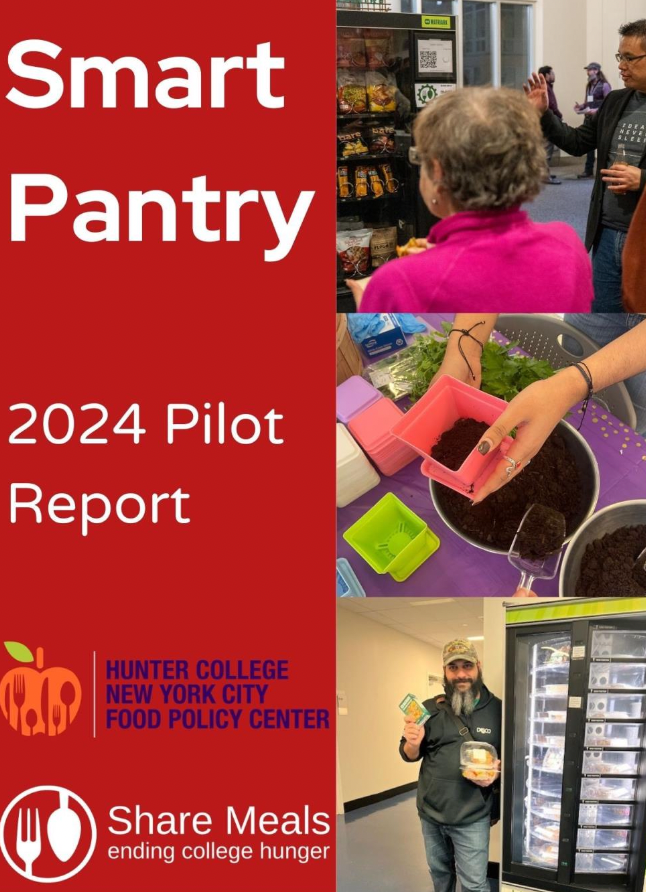
Food insecurity statistics are discouraging when you consider the entirety of New York City, however, specific subsets also have daunting statistics. In 2022, 40 percent of CUNY students self-reported as food insecure. This is an issue of nutrition and food justice, but also a matter of academic concern, with food insecurity acting as a detriment to student performance and a factor in classroom attrition. The trend, however, is far from exclusive to the CUNY system. Nationwide, 34.5 percent of undergraduate students report low to marginal food security, and this number only climbs for institutions serving Black, Latino, Indigenous, and Asian & Pacific Island communities (see Table 1 in this report from Temple University).
In light of these unsettling realities, over the past decade, the number of campus food pantries has grown from around 80 to more than 800 to meet the needs of the students. While the effort is clearly necessary, traditional pantry models have unavoidable drawbacks – from the hours they are open to their ability to train and keep staff, the physical space they must occupy, the dearth of vital data they collect, and the continued social stigma under which they operate.
The Hunter College New York City Food Policy Center (the Center) has collaborated with Share Meals (SM) to present a Smart Pantry Pilot Program as both a way to alleviate campus food insecurity and a promising alternative to the traditional campus pantry model.
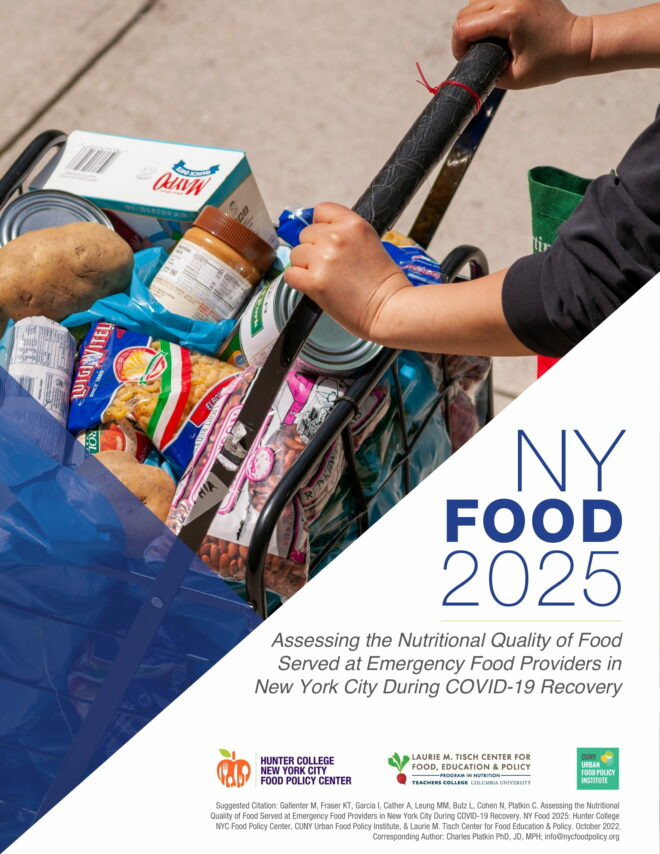
At the onset of the COVID-19 pandemic, New York City agencies and community-based organizations worked quickly to provide emergency food relief to NYC residents. However, a range of stakeholders (including people receiving emergency food) raised concerns about the nutritional quality and cultural appropriateness of food distributed by these emergency and institutional food programs. A number of challenges emerged that prevented many emergency food providers and institutional programs from consistently providing high quality, nutritious meals to New Yorkers over the course of the pandemic, including staffing shortages, limited infrastructure, supply chain disruptions, and food safety concerns.
In response to the insufficiency of available data documenting the nutritional quality of meals and food products distributed at EFPs in NYC during the COVID-19 pandemic, researchers at the Hunter College New York City Food Policy Center (Hunter) and CUNY Urban Food Policy Institute (CUNY) developed and piloted an efficient and affordable system to monitor the nutritional quality of food served at EFPs. The system uses the NYC Food Standards and USDA’s MyPlate as guides to assess the nutritional quality of food served.
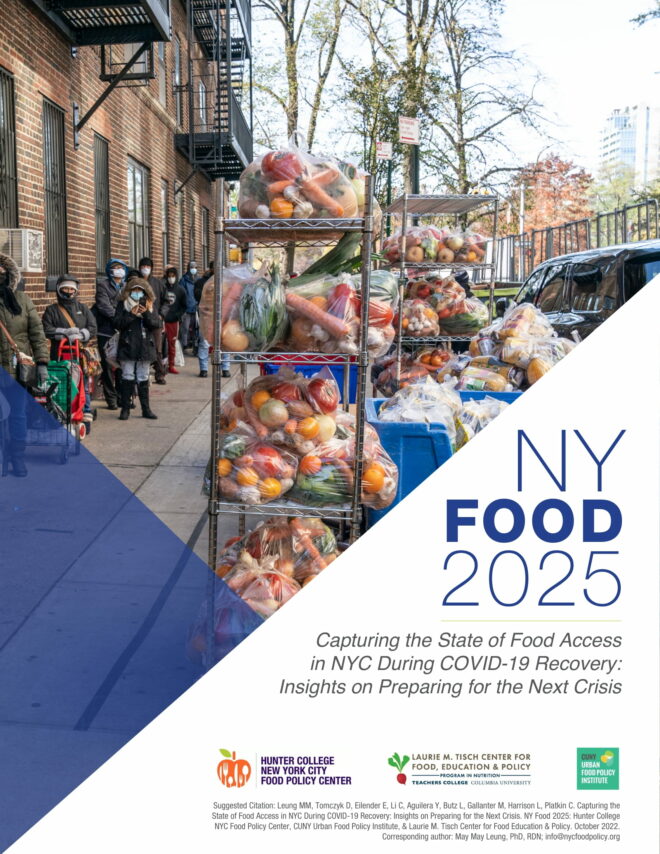
Food insecurity and difficulties accessing high quality, nutritious food are issues that have impacted New York City residents (“New Yorkers”) since long before the onset of the COVID-19 pandemic. For many New Yorkers, the uncertainties associated with the virus’ unpredictable nature and its impact on daily life have exacerbated the already strained system of New York City’s food safety net.
The purpose of this study was to better understand the unprecedented challenges related to healthy food access and food security experienced by residents living in underserved communities in New York City (NYC) during the COVID-19 pandemic using a mixed methods approach. This included qualitative data from Photovoice interviews and Twitter posts as well as quantitative data from food pantry opening/ closing figures.
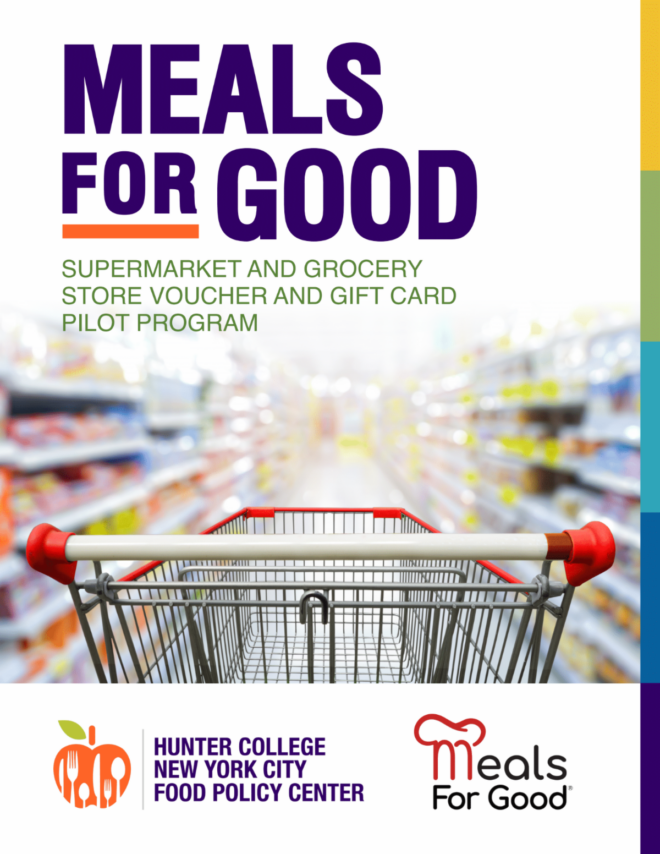
To combat the issue of poverty and food insecurity in East Harlem and the South Bronx, Meals For Good, Inc. (MFG) developed a supermarket-based food voucher and gift card program funded by the Robin Hood Foundation, a poverty-fighting charitable organization based in New York. MFG created vouchers and gift cards for buying foods at designated supermarkets (vouchers in East Harlem), and any grocery store or bodega (gift cards in the South Bronx). MFG partnered with three community-based organizations in East Harlem and one in the South Bronx to distribute the vouchers and gift cards to residents experiencing food insecurity in June and July 2021.
Individuals and families received a one-time incentive to purchase food at local grocery stores, in the form of vouchers or gift cards. The participating supermarkets printed out a duplicate receipt for purchases made with the incentive, which was then shared with the Hunter College New York City Food Policy Center research team.
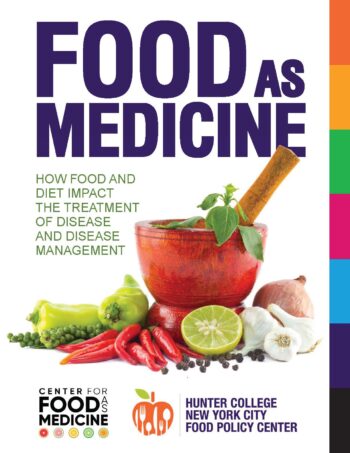 Food As Medicine: How Food and Diet Impact the Treatment of Disease and Disease Management
Food As Medicine: How Food and Diet Impact the Treatment of Disease and Disease Management
There is overwhelming evidence demonstrating the impact of food and diet on health, specifically among food-related diseases. Whether or not a poor diet can cause damage to the body should no longer be debated, as evidence supports the potential causal relationships between dietary factors and diet-related diseases such as ischemic heart disease, diabetes, and certain cancers. While diet has the potential to cause disease, it is also capable of building, maintaining, and restoring health. The report aims to bridge the gap between traditional medicine and the use of food as medicine in the prevention and treatment of disease.
This comprehensive narrative review and report is divided into five parts, including: 1) background information on the history of using food to treat disease, 2) modern challenges to widespread use and acceptance of food as medicine practices, 3) current evidence about contemporary food as medicine practices (such as medically tailored meals, produce prescriptions, and functional foods), 4) literature review of food as treatment for specific disease states, and 5) recommendations to stakeholders (including policymakers, health care professionals, and academics) to contribute to a healthier, more equitable health care system.
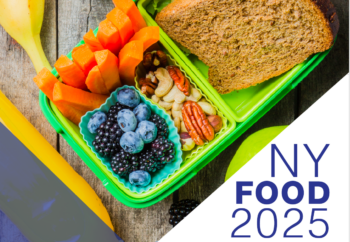 NY Food 2025: Policy Recommendations for a Stronger, Healthier, More Just, and Sustainable Food System in NYC
NY Food 2025: Policy Recommendations for a Stronger, Healthier, More Just, and Sustainable Food System in NYC
New York Food 2025 is a collaborative effort by The Hunter College NYC Food Policy Center, The Laurie M. Tisch Center for Food, Education & Policy, and The CUNY Urban Food Policy Institute to examine the effects of the pandemic on New York City’s food policies and programs. Below is a series of policy briefs and recommendations that builds on the group’s earlier report, New York Food 20/20: Vision, Research, and Recommendations During COVID-19 and Beyond, and proposes specific policy measures the NYC Mayor and City Council can consider to create a stronger, healthier, more just, and sustainable food system in New York City.
The briefs present 28 concrete recommendations to reduce food insecurity; improve healthy food access; reduce promotion and availability of unhealthy food; support a robust, sustainable, and equitable food infrastructure; protect and empower food workers; advance food planning; and increase citizen control and ownership of the food system. To see each brief, click the links below:
- Goal 1: Ensuring New York City’s Food Policies and Programs Reduce Food Insecurity for All New York City Residents
- Goal 2: Improving Healthy Food Access for All New York City Residents
- Goal 3: Reducing Promotion and Ubiquity of Unhealthy Food in Community, Institutional, and Retail Settings to Reduce the Staggering Burden of Diet-Related Disease in NYC
- Goal 4: Promoting Recovery, Growth, and Resiliency That Builds a More Robust, Sustainable, and Equitable Infrastructure for New York City’s Food Distribution, Retail, and Service Economies
- Goal 5: Ensuring All NYC Food Workers Have Safe Working Conditions, the Right to Organize, and Sufficient Pay and Benefits
- Goal 6: Improve Coordination and Monitoring of Food Policy in New York City to Improve Health and Equity
- Goal 7: Increasing Community and Public Control and Ownership of New York City’s Food System
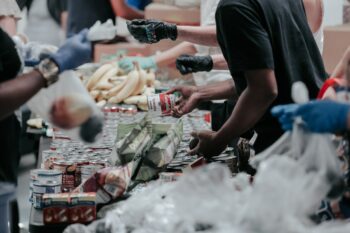
Towards a NYC COVID-19 Food Response in 2021
The NY Food 20/20 Project, a collaboration of the Hunter College NYC Food Policy Center; Laurie M. Tisch Center for Food, Education & Policy and CUNY Urban Food Policy Institute, is pleased to announce the release of a new report, Towards a NYC COVID-19 Food Response in 2021.
Towards a NYC COVID-19 Food Response in 2021 includes evidence and recommendations to help officials, activists, health professionals, community-based organizations, and food businesses repair the damage that COVID-19 has caused to New York City’s food system. The report includes six overarching goals, each accompanied by two priority action strategies and implementation examples, that seek to address new and pre-existing underlying issues within NYC’s food system.
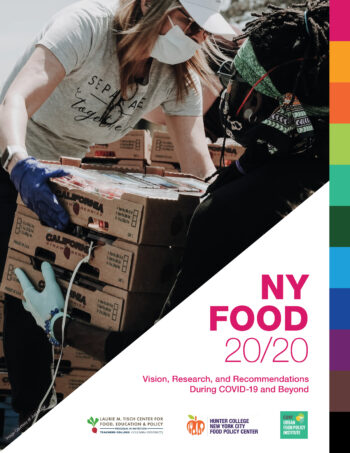
NY Food 20/20 Visions, Research & Recommendations for Food Systems During COVID-19 and Beyond
The Hunter College NYC Food Policy Center in collaboration with the CUNY Urban Food Policy Institute and the Laurie M. Tisch Center for Food, Education & Policy have joined forces to monitor and assess New York City’s food system response to COVID-19 to date and over the next 18 months. The Center’s have collaborated to produce the first independent assessment of the effects of COVID-19 on our food system and an assessment of the many public and private responses.
In this first report of NY Food 20/20, the Centers examined the effects of the first six months of the COVID-19 pandemic and its economic consequences on New York’s food system and the health and wellbeing of New Yorkers. The Centers also discussed the creation and early implementation of some of the City’s responses to COVID-19 related food system changes and offered concrete actions that public officials and agencies, civil society groups and others can take with a focus on how to minimize the harms and maximize the opportunities to address the underlying problems the pandemic has exacerbated.
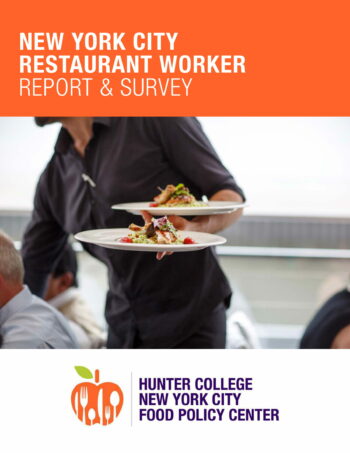
NYC Restaurant Workers Report
The Hunter College New York City Food Policy Center conducted a city-wide survey of restaurant workers to examine the industry’s climate from their perspective, explore the extent to which workers’ rights and benefits are implemented, and compare working conditions in “good food”/health- forward restaurants with those in other types of restaurants.
Based on the survey findings, the report concludes with actions and policies to increase employees’ wages and opportunities and to expand the protection and rights of those working in the restaurant industry.
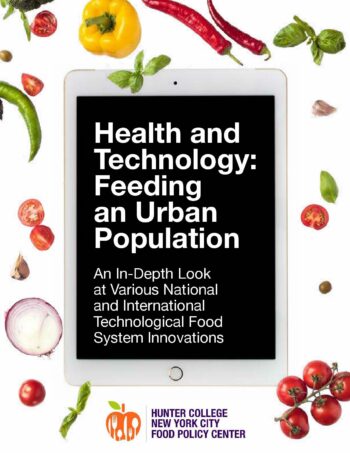
Health Tech and Feeding an Urban Population
The goal of this report is to inspire readers – including academics, researchers, community-based organizations, funders, social entrepreneurs, policymakers, government agencies and others involved in the food movement – to think about innovative, technological ways to overcome the challenges facing the food system, including food insecurity (i.e., hunger), access to healthy food, food waste, food safety and food-related chronic diseases.
By describing the ways that technology has been used to find new solutions to long-standing food system problems and by identifying areas where technological development is lagging, the Hunter College New York City Food Policy Center hopes to also encourage those in the tech industry to partner with food system influencers to drive increased innovation in this
important sector.
This report focuses on the food supply chain and is the second in a series of five reports the Center will release over the next six months. The first report on Food Insecurity is available here. Subsequent topics include: Food Waste; Food Safety; and Nutrition and Diet-Related Diseases.Download the report here>>>
Is the Organic Label as Valuable as You Thought?
Organic food sales are booming. Question is, though, can consumers trust the label or does it bear too many blemishes to have credibility?
Food labels are a dime a dozen these days. Yet, while many hold little to no merit– think “natural” and “free-range” – others, particularly “organic,” must comply with strict government standards. Those standards, established under the Organic Foods Production Act of 1990, make these products subject to inspection and require that their cultivation follow approved practices and use only allowed substances.
By all accounts, organic food sales are booming. According to a survey by the Organic Trade Association, 82 percent of American households buy organic on a regular basis, pushing total U.S. organic sales in 2016 to almost $50 billion. Overall, organic accounts for five percent of total food sales in this country, which may be attributed to organics going mainstream. Now that stores like Wal-Mart, Safeway and Albertsons have expanded their selection of organics, the cost has become more affordable. According to a Consumer Reports study, a handful of organic items cost no more than their non-organic counterparts.
 The Price of Food in NYC: A Comparison of Supermarkets
The Price of Food in NYC: A Comparison of Supermarkets
Can a half gallon of milk cost $1.59 in one neighborhood and $4.84 in another that’s only a few miles away? Between February and April of 2017, under the direction of the Hunter College NYC Food Policy Center, 30 undergraduate Hunter College Nutrition students visited 41 supermarkets and farmers’ markets in their neighborhoods to answer that question.
As we know, there is no silver bullet for creating access to healthy food. Numerous factors, including convenience, affordability, transportation, previous shopping experiences, and even the weather can impact a person’s ability and/or desire to purchase fresh, nutritious food.
The data from this survey shines light on the wide variation in the cost of specific healthy food items and demonstrates that shopping for healthy foods on a budget isn’t easy. Shoppers have to be savvy, mindful, aware, and often willing to travel some distance to find healthy foods at the best price in New York City.
Terminology: A Study of Two NYC Neighborhoods
With the increase in obesity and other diet-related diseases, as well as the persistence of food insecurity among many vulnerable populations, the need for transformative changes to our food systems and local food environments is critical. In an effort to improve population health, and the health of New York City residents, the Hunter College New York City Food Policy Center is constantly seeking to better understand the differences and similarities across neighborhood food environments.
The Center conducted a short survey in East Harlem and the Upper East Side to understand knowledge, attitudes, and behaviors around food, and to inform policymaking that addresses food-related health inequities in New York City.
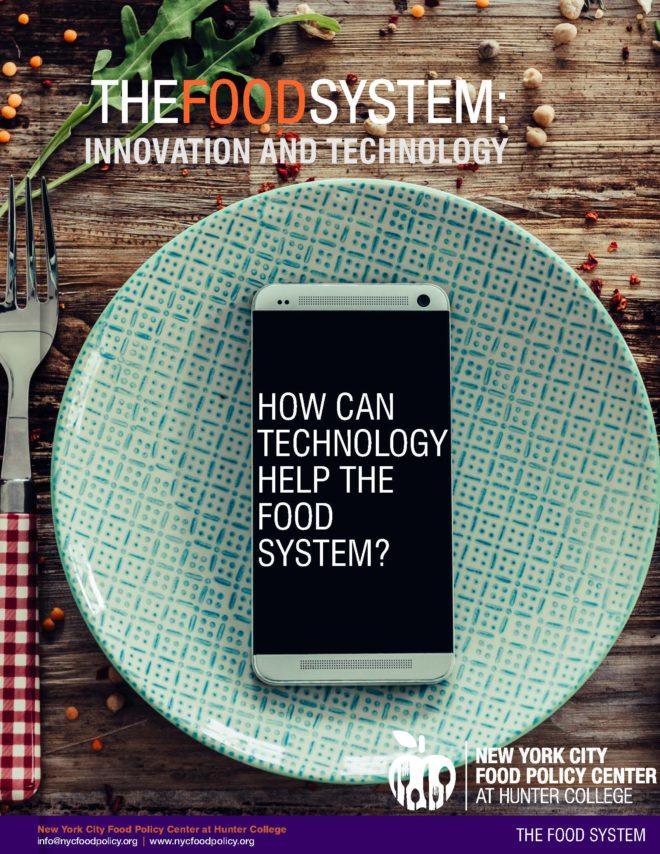
Health Tech and Food Insecurity
The digital revolution over the past 25 years has transformed the way we communicate, learn, conduct business, purchase goods and obtain information. Industrialization, urbanization and market globalization have led to significant shifts in lifestyle, eating behavior and food choices worldwide. The Center’s latest report examines how technology can help the food system. The report is the first in a series of five about innovation and technology in the food system.
The goal of these reports is to inspire readers–including academics, researchers, community-based organizations, funders, social entrepreneurs, policymakers, government agencies and others involved in the food movement to think about innovative, technological ways to overcome the challenges facing the food system. These challenges include food insecurity, access to healthy food, food waste, food safety and food-related chronic diseases.
This first report discusses and demonstrates ways that technology can help food-insecure individuals access and afford food. Though not a solution to poverty and the other root causes of food insecurity, technology can make it easier for people to sign up for and use federal food assistance benefits, learn about resources in their communities, access nutrition education, plan low-cost meals and save money while grocery shopping. This report and upcoming reports include many examples that demonstrate creative solutions to complex food system issues and also identify areas where new technological developments are needed.
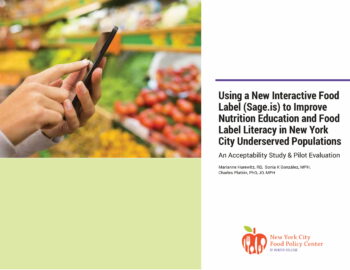 Using a New Interactive Food Label (Sage.is) to Improve Nutrition Education and Food Label Literacy in New York City Underserved Populations An Acceptability Study & Pilot Evaluation
Using a New Interactive Food Label (Sage.is) to Improve Nutrition Education and Food Label Literacy in New York City Underserved Populations An Acceptability Study & Pilot Evaluation
The research project, which studied the use of technology to inspire “mindful eating,” represents a unique cross-sector collaboration among Hunter College researchers, an IT development team at the New York University Interactive Telecommunications Program (NYUITP), City Harvest, and its community partner, the Northeast Brooklyn Housing Development Corporation (NEBHDCo). Funded by the NYC Food Policy Center at Hunter College and a CUNY Public Health Practice and Community Engagement faculty grant (IRB approval #2015-1415), the researchers sought to understand if using a smartphone app could help participants at one of City Harvest’s Healthy Neighborhood cooking workshops (hosted by NEBHDCo) improve mindfulness about food choices. “Mindful eating” can help individuals become attuned to physical and emotional sensations while eating, and can be associated with healthful dietary behaviors 1.
The NYUITP team developed Sage.is, an interactive app that simulated an in-depth and user-friendly version of an on-package nutrition label. Users set up a profile with Sage.is’ userdesigned onboarding process, with their height, weight, activity level, and dietary preferences. The app customizes product information for hundreds of branded food products according to individual needs. It also features novel tools, including “exercise equivalents” to help people understand how much exercise is needed to burn the calories found in a specific food item, and “food origin” information that tells how far foods have traveled from the source to the grocer.
 The Public Plate in New York City
The Public Plate in New York City
This report examines the health and economic impact of the more than 260 million meals the City serves each year in public schools, child care and senior citizen programs, homeless shelters, jails, hospitals, and other settings. This market power can make healthier, more affordable food available to all New Yorkers. Over the last decade much has been done to improve this system; this report suggests specific ways and areas in which the new Mayoral administration can further improve institutional food.
Download the executive summary here>>>
Download the supplement to the report here>>>
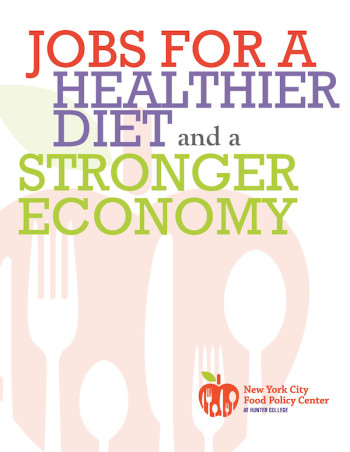
Jobs For a Healthier Diet and a Stronger Economy
This report examines current efforts to create new food jobs in New York and explores opportunities for creating additional jobs that provide a living wage and contribute to making healthy food more available and affordable. The report examines the role HUNTER and CUNY can play in creating a good food workforce for New York City.
Download the full report here>>>

